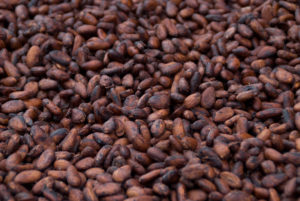Cocoa Beans, also called cacao bean, cocoa (/ˈkoʊ.koʊ/), and cacao (/kəˈkaʊ/), is the dried and fully fermented seed of Theobroma cacao, from which cocoa solids and, because of the seed’s fat, cocoa butter can be extracted.
Content
Uses
- The “beans” are the basis of chocolate, and of such Mesoamerican foods as mole and tejate.
Benefits
- Magnesium, and other essential minerals including calcium, sulfur, zinc, iron, copper, potassium, and manganese.
- Polyphenols called flavonoids, with antioxidant properties.
- Vitamins: B1, B2, B3, B5, B9, E.
- Essential heart-healthy fat: oleic acid a monounsaturated fat.
- Protein.
- Fiber
Cautions
Eating cocoa is LIKELY SAFE for most people. Cocoa contains caffeine and related chemicals. Eating large amounts might cause caffeine-related side effects such as nervousness, increased urination, sleeplessness, and a fast heartbeat.
Cocoa can cause allergic skin reactions, constipation, and might trigger migraine headaches. It can also cause digestive complaints including nausea, intestinal discomfort, stomach rumbling, and gas.
Applying cocoa butter to the skin is also LIKELY SAFE for most people. It can, however, cause a rash.
Special Precautions & Warnings:
Pregnancy and breast-feeding: Cocoa is POSSIBLY SAFE in pregnancy and during breast-feeding when used in moderate amounts or in amounts commonly found in foods. But be sure to monitor your intake.
Cocoa in larger amounts is POSSIBLY UNSAFE because of the caffeine it contains. Caffeine found in cocoa crosses the placenta producing fetal blood concentrations similar to the mother’s levels. Although controversial, some evidence suggests that high doses of caffeine during pregnancy might be associated with premature delivery, low birth weight, and miscarriage. Some experts advise keeping caffeine consumption below 200 mg per day during pregnancy. Keep in mind that chocolate products provide 2-35 mg caffeine per serving and a cup of hot chocolate provides approximately 10 mg.
Caffeine is also a concern during breast-feeding. Breast milk concentrations of caffeine are thought to be approximately half the level of caffeine in the mother’s blood. If the mother eats too much chocolate (16 oz per day), the nursing infant may become irritable and have too frequent bowel movements because of the caffeine.
Anxiety: There is a concern that the caffeine in large amounts of cocoa might make anxiety disorders worse.
Bleeding disorders: Cocoa can slow blood clotting. Consuming a lot of cocoa might increase the risk of bleeding and bruising in people with bleeding disorders.
Heart conditions: Cocoa contains caffeine. The caffeine in cocoa might cause irregular heartbeat in some people and should be used cautiously in people with heart conditions.
Diabetes: Cocoa seems to be able to raise blood sugar levels and might interfere with blood sugar control in people with diabetes.
Diarrhea. Cocoa contains caffeine. The caffeine in cocoa, especially when taken in large amounts, can worsen diarrhea.
Gastroesophageal Reflux Disease (GERD): Cocoa seems to hinder the effectiveness of the valve in the food tube (esophagus) that keeps the contents of the stomach from coming back into the food tube or the airway. This could make the symptoms of GERD worse.
Glaucoma: Cocoa contains caffeine. The caffeine in cocoa increases pressure in the eye and should be used cautiously in people with glaucoma.
High blood pressure: Cocoa contains caffeine. The caffeine in cocoa might increase blood pressure in people with high blood pressure. However, for people who already consume a lot of caffeine, it might not cause a big increase.
Interactions
Unknown, please consult with your doctor
Other names
cocoa, cacao
References
Source: Wikipedia, https://en.wikipedia.org/wiki/Cocoa_bean
Builtlean, https://www.builtlean.com/2012/04/12/raw-chocolate/
WebMD, http://www.webmd.com/vitamins-supplements/ingredientmono-812-cocoa.aspx?activeingredientid=812&

